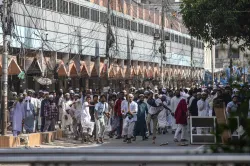Bangladesh top court scraps most job quotas after 133 killed in violent protests
The court's Appellate Division dismissed a lower court order that had reinstated the quotas, directing that 93% of government jobs will be open to candidates on merit, without quotas.

Dhaka: Bangladesh's Supreme Court on Sunday scrapped most of the quotas on government jobs that have sparked student-led protests in which at least 133 people have been killed in the South Asian country, news agency Reuters reported citing local media. The court's Appellate Division dismissed a lower court order that had reinstated the quotas, directing that 93% of government jobs will be open to candidates on merit, without quotas, the reports said.
Prime Minister Sheikh Hasina's government had scrapped the quota system in 2018, but the lower court reinstated it last month, sparking the protests and an ensuing government crackdown. It was not immediately clear how the protesters would react to the decision.
Curfew imposed in Bangladesh, shoot at sight order granted
The government had extended a curfew as authorities braced for the Supreme Court hearing on the job quotas. Soldiers were on patrol on the streets of capital Dhaka, the centre of the demonstrations that spiralled into clashes between protesters and security forces.
Internet and text message services in Bangladesh have been suspended since Thursday, cutting the nation off as police cracked down on protesters who defied a ban on public gatherings. The curfew was extended to 3 p.m. (0900 GMT) and was to continue for an "uncertain time" following a two-hour break for people to gather supplies, local media reported. Besides, local media also reported that the government has granted "shoot at sight" order to those who defy the curfew rules.
Govt ready to hold talks with protestors: Law Minister
Earlier today, Enisul Huq, the Minister of Law, Justice, and Parliamentary Affairs, stated that the government has agreed in principle to quota reform and is prepared to engage in discussions with the quota reform protesters, BSS reported.
"The Prime Minister has entrusted me and Education Minister Mohibul Hasan Chowdhury with the responsibility to negotiate with them. We are willing to engage in talks with them at their convenience. If they wish to discuss today, we are prepared," the law minister announced during a media briefing at the Jatiya Sangsad Bhaban this afternoon.
"I urge them to consider withdrawing or suspending their movements," he added. "In Bangladesh, the rule of law prevails. Any issue brought before the court is adjudicated accordingly. When the quota issue comes before the court, the government will propose reforms, and it will be decided through legal proceedings," Anisul further explained.
Why are Bangladeshi students protesting?
The demonstrations started last month after the High Court reinstated a quota system for government jobs, overturning a 2018 decision by Prime Minister Sheikh Hasina's government to scrap it. That move, which covered the 30% of jobs reserved for family members of freedom fighters in the 1971 war for independence from Pakistan, followed similar student protests. But the Supreme Court suspended the high court order after the government's appeal, setting a date of August 7 to hear the government's challenge.
However, the students stepped up their protest when Hasina refused to meet their demands, citing the court proceedings. She called the protesters "razakar", making use of an offensive term for those accused of collaborating with Pakistan's army in 1971 to betray the country.
What is the quota system in Bangladesh?
Introduced in 1972, Bangladesh's quota system has gone through several changes since. When it was abolished in 2018, 56% of government jobs were blocked under various quotas. The bulk covered groups such as freedom fighters' families, with women and those from underdeveloped districts receiving a share of a tenth each, with 5% allotted to indigenous communities, and 1% for the disabled. The protesting students want all categories abolished, except the last two.
What sparked the violence in Bangladesh?
The protests turned violent this week following clashes between thousands of anti-quota demonstrators and members of the student wing of Hasina's Awami League party. Police fired rubber bullets and hurled sound grenades and tear gas to scatter protesters who also blocked railway tracks and major roads. As of writing this article, 133 people were killed in the deadly violence.
What do the students fear?
Hasina is the daughter of Sheikh Mujibur Rahman, the founding father of Bangladesh, who led its freedom movement. Protesters and critics say the 30% quota for families of freedom fighters favours Awami League supporters, which led the independence fight. Experts also attribute the unrest to stagnant job growth in the private sector, making public sector jobs, with their accompanying regular wage hikes and privileges, very attractive.
The quotas shrink the number of government jobs open for all, hurting aspirants who want them filled on the basis of merit. They have sparked anger among students grappling with high youth unemployment, as nearly 32 million young people are out of work or education from a population of 170 million. The economy, once among the world's fastest growing, has stagnated, inflation hovers around 10% and dollar reserves are shrinking.
What has PM Hasina said?
The protests are the first challenge to Hasina's government since she won a fourth consecutive term in January in elections boycotted by the main opposition. She has condemned the loss of lives and called for patience until the Supreme Court delivers its verdict.
(With inputs from agency)